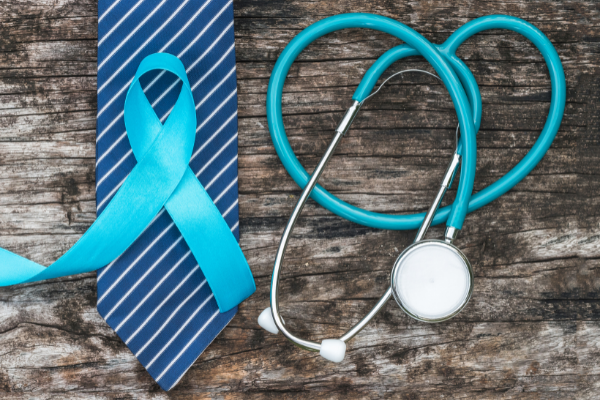Move Over November, it’s Movember Now

Welcome to Movember, aka Men’s Health Awareness Month, aka the month where the streets are filled with men growing out their mustaches. While we love to see everyone excited about having an excuse to not shave, we are here to remind everyone that this month holds real significance in the community.
So, what is Movember all about? Movember takes place every year in, you guessed it, November. The annual event raises awareness for men’s health issues including prostate cancer, testicular cancer, and men’s mental health. The Movember Foundation has helped lead the charge in creating awareness for this topic. While men’s health should always be a priority, this month serves as a yearly reminder to schedule that annual wellness exam, eat a little bit healthier, reach out to a therapist, or implement other tactics to promote sexual, mental, and physical health.
Show me how you work, work, work on that physical wellness
It’s no secret that physical wellness has an impact on your overall health. Physical wellness looks different on everyone – to one person it may be eliminating certain food from their diet and to another person, it is going on a daily walk. But one thing is for sure, physical wellness is extremely beneficial for long-term health.
In the true spirit of Movember, we will dive into all things sexual health as it relates to the male anatomy, specifically the prostate and testicles. To start, prostate cancer is the second most common cancer in the United States, according to the American Cancer Society. In fact, about one in eight men will be diagnosed with prostate cancer in their lifetime and it mostly affects men ages 65+. This does not mean that men younger than 65 should not be tested for prostate cancer, especially if there is a family history of the disease.
While there is no way to completely eliminate one’s chances of developing prostate or testicular cancer, there are sure ways to reduce the risk. By considering the steps below, as outlined by the Mayo Clinic, you won’t only feel better physically, but you may also experience a positive impact on your mental and sexual wellbeing as well.
1. Choose a healthy diet
There is power behind the foods that we choose to put in our bodies. Understanding the nutritional value behind different foods can help aid in the development of a nourishing diet. Consider adding more fruits, vegetables, and omega-3 fatty acids.
2. Maintain a healthy weight
It goes without saying, but maintaining a healthy weight plays a key role in staying well “healthy”. Weight looks different for everyone, so consider consulting your doctor about what is best for you. Not only does maintaining a healthy weight help prevent prostate cancer, but it can also reduce the risk of developing other health issues as well.
3. Exercise often
Exercise is one of the keys to staying healthy. Not only can it reduce inflammation and improve immune function, but it can also help fight the negative health effects of an inactive lifestyle.
4. Have open conversations with your doctor
The best way to develop healthy habits is to understand why you are building them, and that starts by having open, honest conversations with your doctor about your physical wellness and health journey. It’s also important to talk to your doctor about regular prostate exams once you hit 65+ (or earlier depending on family history). Your doctor can advise you on when and how you should start screening for prostate and testicular cancer, as well as on how to develop healthy habits.

It’s about time we talk about sexual wellness
You may ask yourself, “sexual wellness, what could that possibly mean?” Well, it’s actually extremely important to have a strong understanding of what it means to be sexually healthy because it affects your mental and physical health as well. Sexual health isn’t just about wearing a condom to stay safe from sexually transmitted diseases (STIs) or preventing unplanned pregnancies, but it also deals with how you perceive sex. Medgadget explains sexual wellness as a blend of one’s physical state, mental state, and social wellbeing as it connects to sexuality. Basically, feeling comfortable and confident about sex and sexuality is the goal.

Dr. Justin Lehmiller, ASTROGLIDE’s Resident Sex Researcher, comes to the rescue to walk us through what it means to be sexually healthy and how to enhance your sexual health. Below are several key components and steps that improve your sexual health, so take notes.
1. Unburden yourself from sexual shame and guilt
Since sexual health ties into how you perceive sex, it is important to be open and honest with yourself and any potential partners. If you feel shame, embarrassment, uneasiness, or other negative emotions about sex or your sexual fantasies, chances are you will have a hard time enjoying it. So, what’s the key to unburdening yourself from any potential shame? Self-acceptance and readjusting your beliefs for what is considered ‘normal’ when it comes to sex.
2. Feel comfortable and confident discussing sex
We have all heard that communication is key, and this holds true for communication before, during, and after sex. A lack of communication can cause unnecessary conflict for sexual partners. If you do not communicate what you like or dislike during sex, how is your partner expected to know?
Unburden yourself from sexual shame can help remove a heavy barrier and help you express what feels good. There are a few ways to communicate what you want sexually to your partner:
- Talk them through your fantasies
- Moan and groan when something feels good, signaling to your partner that whatever they are doing feels right. This is a great opportunity to introduce lube into the bedroom to enhance pleasure – try using ASTROGLIDE Quiver Liquid for a touch of sensation.
- Show them! Touch yourself while your partner watches so they can get a better sense of what you want
3. Understand your body
No one knows your body better than you do, so explore, don’t be shy. Masturbation is a great way to gain confidence both in and out of the bedroom. Take your time with it, not every masturbation session needs to end quickly just to get the job done. Understand your body and what feels best: experiment with toys, try a new type of lubricant, masturbate in front of the mirror. Feeling comfortable and confident in your body will lead to stronger sexual health.
Still curious about the connection between sexual and mental health? Dr. Joshua Gonzalez, ASTROGLIDE’s Sexual Health Advisor, sat down with Dr. Justin to discuss the connection between the two. Check out this video-
Take care of your mentals
There is a lot of stigma surrounding mental health, especially amongst cis-gendered men who are often exposed to toxic masculinity. It’s time to smash the stigma around mental health and offer everyone equal resources to emote and get help when needed. Mental health impacts everyday life and is a vital component of overall wellness. We must break out of the narrative that men should not discuss mental health because nearly 1 in 10 men in the United States suffers from varying levels of daily depression or anxiety.

Still not convinced that men’s mental health should be taken seriously? The American Foundation for Suicide Prevention found that in 2019, men were 3.63x more likely to die by suicide than women. There are a few signs that are signals that you or someone close to you may be struggling and should seek professional help:
- Change in mood
- Difference in work performance
- Weight changes
- Sadness, hopelessness, or anhedonia (a loss of pleasure and pulling away from things that used to provide enjoyment)
- Physical symptoms, such as headaches and stomach issues
If you or a loved one is experiencing any of these symptoms a good place to start is by scheduling an appointment with a therapist, primary doctor, or other mental health professional. If this feels too daunting there are online resources that can point you in the right direction:
National Suicide Prevention Lifeline: 800-273-8255
Suicide Prevention Resource Center: https://www.sprc.org/
If you are curious about how to get involved in Men’s Health Awareness Month or are looking for additional resources, check out the Movember website here. So now when someone asks you, “what is Movember all about,” you’ll be equipped with the answer.
